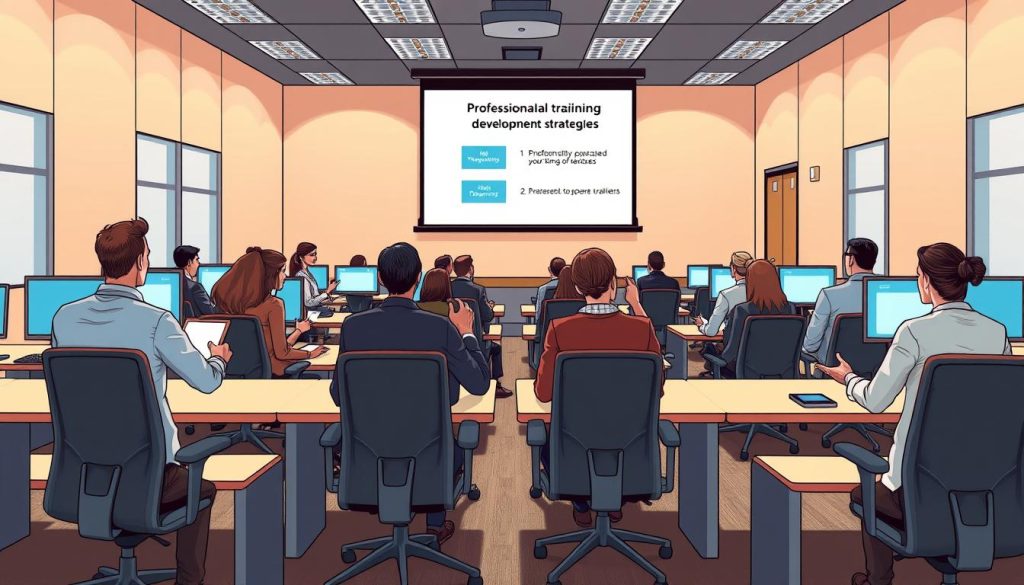What if the key to unlocking your full career potential isn’t just about working harder—but smarter? In a world where 65% of jobs that will exist in 2030 haven’t even been invented yet*, how do you stay ahead in a constantly shifting professional landscape?
The concept of career growth has transformed dramatically since the 1960s. Back then, structured training programs were rare. Today, success demands adaptive strategies that blend tried-and-true methods with cutting-edge digital tools. It’s not just about checking boxes for promotions—it’s about creating lasting value in your field.
Modern professionals face a paradox: more opportunities than ever, yet greater competition. This guide reveals how to navigate this reality through approaches that strengthen both technical abilities and strategic networking. You’ll discover why 42% of career advancements come from informal learning opportunities, and how to leverage them without sacrificing stability.
Table of Contents
Key Takeaways
- Continuous growth matters more than ever in fast-changing industries
- Effective strategies combine traditional mentoring with digital upskilling
- Confidence and connections drive long-term success as much as technical skills
- Proven methods exist for balancing security with career transitions
- Flexible learning options adapt to busy schedules and preferences
Introduction to Professional Development
Navigating today’s work environment requires more than just showing up. Modern career growth hinges on intentional skill-building and strategic adaptation. Think of it as upgrading your professional toolkit—not once, but continuously.
What Defines Career Advancement?
Career advancement isn’t limited to promotions. It’s about:
- Mastering emerging tools and industry trends
- Building cross-functional expertise
- Strengthening leadership qualities
Unlike personal growth, this process targets workplace performance. A marketing specialist might learn data analytics, while a teacher adopts AI-assisted grading systems.
From Training to Transformation
The 1960s introduced formal workplace training. Today, 78% of French professionals* blend digital courses with mentorship. Consider these shifts:
« Success now demands both technical agility and emotional intelligence—skills no manual could teach in 1970. »
Modern strategies include microlearning apps and peer coaching networks. This evolution addresses France’s competitive sectors like tech and renewable energy, where adaptability determines long-term relevance.
Importance of Professional Development in a Competitive Job Market
Did you know 4 out of 5 workers feel stuck in roles that don’t expand their skills? This gap between employee expectations and employer support drives France’s competitive talent wars. Companies that prioritize growth initiatives see 34% higher retention rates than those relying solely on salary incentives.
Retention Through Skill Investment
When organizations invest in their teams, everyone wins. Consider these findings:
| Metric | With Development Programs | Without Programs |
|---|---|---|
| Annual Retention Rate | 82% | 68% |
| Promotion Readiness | 3.1 years | 5.4 years |
| Cost Per Hire Saved | $3,800 | $0 |
One HR director notes: « Our mentorship initiatives reduced exit interviews citing ‘no growth path’ by 47% in 18 months. » This aligns with data showing 20% of departures stem from stagnant roles.
For professionals, pursuing career opportunities through certifications or lateral moves builds market resilience. As industries like French tech evolve rapidly, continuous learning becomes non-negotiable.
« Investing in people isn’t optional—it’s survival in today’s market. »
Smart employers now blend in-house training with external partnerships. Workers gain adaptable skills while companies stabilize their talent pipelines—a strategic response to France’s shifting economic demands.
Benefits for Employees and Companies
What separates thriving professionals from those stuck in stagnant roles? Research reveals 84% of employees in high-performing organizations receive regular training—compared to just 16% in struggling companies. This gap creates measurable advantages for individuals and businesses alike.
Skill Enhancement and Confidence Building
Learning new competencies does more than expand your toolkit—it transforms how you approach challenges. Mastering technical abilities or workplace strategies creates a ripple effect:
- Certifications validate expertise to employers
- Practical knowledge reduces hesitation in decision-making
- Proven mastery fosters self-assurance in leadership roles
One Paris-based project manager shared: « After completing a negotiation course, I led client discussions with 30% better outcomes. The confidence came from knowing I had tested techniques. »
Increasing Career Advancement Opportunities
Strategic learning directly impacts promotion timelines. Employees with updated qualifications are 2.3x more likely to receive leadership offers. Companies benefit too—teams with skill-building programs see 41% faster project completion rates.
This synergy explains why forward-thinking organizations now prioritize tailored growth plans. As you achieve career growth with stability and, employers gain adaptable talent ready for emerging challenges.
« Investing in our team’s capabilities cut onboarding time for new tech by 60%—it’s the ultimate win-win. »
Implementing Professional Development in the Workplace

Workplaces across France now prioritize structured learning systems to maintain competitive edges. Over 60% of tech and finance companies require annual skill updates, blending mandatory training with optional growth paths. This shift creates environments where teams evolve alongside industry demands.
Integrating Training and Education Programs
Effective systems balance company needs with personal goals. Consider this comparison of program types:
| Program Type | Focus Areas | Employee Preference |
|---|---|---|
| Internal Workshops | Company-specific tools, compliance | 72% participation rate |
| External Certifications | Industry-wide skills, networking | 68% report career impact |
Forward-thinking employers pair in-house mentoring with subsidized courses. A Lyon-based IT firm saw 89% faster project delivery after aligning their workshops with team certification goals.
Workers gain most by combining employer resources with self-driven learning. For example, using career development strategies alongside company trainings helps maintain market relevance during industry shifts.
« Our blended approach reduced skill gaps by 40%—employees feel supported, while we build adaptable teams. »
Regular program evaluations ensure alignment with France’s evolving sectors like green energy and AI. This dual focus on organizational and individual growth fosters lasting professional relationships and technical excellence.
Methods and Strategies for Growth
Building expertise requires mixing classroom-style rigor with real-world adaptability. Modern workers need measurable credentials and practical know-how to thrive. Let’s explore how structured programs and self-driven exploration work together.
Formal Learning: Courses and Certifications
Structured programs create career momentum. Accredited courses validate expertise—78% of hiring managers prioritize candidates with relevant certifications. Key advantages include:
- Industry-recognized qualifications for promotions
- Standardized skill benchmarks across teams
- Clear pathways for specialized roles
A Paris HR manager notes: « Our engineers with cloud certifications resolve client issues 40% faster than peers. »
Informal Learning: Workshops and Self-Study
Knowledge gained outside classrooms often sticks better. Workshops and research projects let you:
- Test ideas in low-risk environments
- Adapt lessons to current projects
- Discover niche skills through experimentation
One marketing specialist shared: « Podcasts on consumer psychology transformed how I pitch ideas—no certificate needed. »
| Method | Credential Value | Flexibility | Skill Application |
|---|---|---|---|
| University Courses | High | Low | Long-term |
| Industry Workshops | Medium | High | Immediate |
| Self-Directed Research | Variable | Maximum | Custom |
Blend both approaches for maximum impact. Weekly workshops plus quarterly certifications keep skills fresh without overwhelming schedules. As France’s tech sector evolves, this balance becomes essential for staying relevant.
The Role of Online Courses and Digital Platforms

Digital education has erased traditional barriers to expertise. Over 76% of French professionals now use online tools to stay competitive*, blending scheduled coursework with spontaneous skill-building. This shift creates opportunities for those balancing full-time roles with growth ambitions.
Embracing E-Learning and Microlearning Trends
Short-form content dominates modern skill acquisition. Microlearning’s 15-minute modules align with workplace demands, offering:
- Immediate application of concepts through case studies
- Flexible scheduling around client meetings or deadlines
- Replayable tutorials for complex tasks
« Our teams complete micro-courses 3x faster than traditional training—and retain 40% more information. »
Platforms now cater to diverse preferences. Compare popular formats:
| Format | Avg. Duration | Completion Rate | Skill Retention |
|---|---|---|---|
| Video Tutorials | 12 mins | 89% | 68% |
| Interactive Quizzes | 8 mins | 94% | 72% |
| Podcast Episodes | 22 mins | 67% | 55% |
This adaptability makes digital options ideal for France’s fast-paced sectors. Workers gain industry-specific knowledge without sacrificing productivity—a balance critical for long-term career momentum.
Embracing Mentorship and Coaching
Imagine having a roadmap created by someone who’s already navigated the path you’re on. Mentorship bridges the gap between ambition and achievement, offering tailored insights you won’t find in textbooks. Since 2020, 33% more organizations have launched mentoring initiatives, recognizing their power to accelerate growth.
Building Relationships That Elevate Careers
Effective mentorship thrives on shared experience rather than rigid structures. Unlike formal coaching with scheduled sessions, these relationships evolve organically. A senior marketing director might share negotiation tactics over coffee, while a tech lead demonstrates leadership approaches during project collaborations.
Consider these differences between mentoring and coaching:
| Aspect | Mentoring | Coaching |
|---|---|---|
| Focus | Long-term career growth | Specific skill improvement |
| Structure | Flexible meetings | Scheduled sessions |
| Outcome | Broad professional development | Measured performance gains |
One Lyon-based engineer credits her mentor with « unlocking promotion opportunities I didn’t know existed. » This mirrors findings showing mentored employees achieve leadership roles 18 months faster than peers.
To start benefiting:
- Identify professionals whose goals align with yours
- Seek advice on overcoming specific challenges
- Convert insights into actionable steps
Remember, the best mentorships become two-way streets. As you grow, you’ll naturally transition into guiding others—creating cycles of continuous learning across industries.
Leveraging Conferences, Seminars, and Workshops
Unlocking career growth often happens beyond office walls. Industry events act as accelerators for skill-building, connecting you directly with innovators shaping your field. Face-to-face interactions at conferences reveal emerging trends before they hit mainstream channels—a critical edge in France’s fast-moving sectors like tech and green energy.
These gatherings transform passive learning into active collaboration. Networking breaks become opportunities to forge strategic partnerships, while panel discussions offer firsthand insights from leaders. One Lyon-based engineer landed a breakthrough project after sharing coffee with a speaker specializing in AI logistics.
Speaking roles amplify your impact. Presenting research or leading workshops establishes credibility while refining communication skills. As one Paris consultant noted: « Preparing my TEDx talk forced me to distill complex ideas—now clients grasp proposals faster. »
Maximize event ROI with tactical planning:
- Target gatherings aligned with your expertise gaps
- Engage speakers through thoughtful questions
- Convert contacts into collaborators via prompt follow-ups
France’s thriving event scene—from Cannes Lions to Viva Technology—provides platforms to showcase knowledge while absorbing industry shifts. The right conference can pivot careers faster than months of solitary work.
FAQ
How does career growth benefit both workers and employers?
Strengthening skills through targeted learning boosts confidence and productivity for individuals. For companies, it reduces turnover by 40%+ while fostering innovation through upskilled teams aligned with industry shifts.
What are cost-effective ways to integrate learning into busy schedules?
Microlearning platforms like LinkedIn Learning offer 15-minute courses. Employers can sponsor certifications from Coursera or host monthly skill-sharing lunches. Self-paced options like podcasts or industry webinars fit irregular hours.
Why has mentorship become critical in modern career paths?
76% of professionals credit mentors for navigating role transitions. Structured programs at firms like Deloitte pair juniors with leaders for shadowing, feedback loops, and leadership pipelines – creating loyalty and knowledge retention.
How do conferences directly impact earning potential?
Events like SXSW or Adobe MAX provide exclusive certifications. Attendees gain negotiation leverage – 68% report salary bumps post-attendance. Networking with speakers from Google or IBM often leads to collaborative projects or job referrals.
What metrics prove the ROI of training programs?
Track promotion rates post-certification (e.g., PMP-certified managers see 22% faster advancement). Use tools like SurveyMonkey to measure engagement spikes. Salesforce reports 3x faster onboarding for teams using Trailhead modules.
Can self-taught skills compete with formal education?
GitHub portfolios or Udacity nano-degrees now rival traditional credentials. Companies like IBM prioritize skill-based hiring – 50% of their 2023 tech roles required no college degree. Documented project experience often outweighs transcripts.





